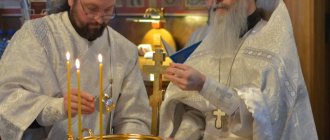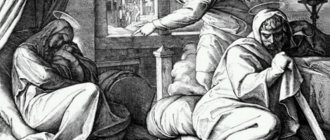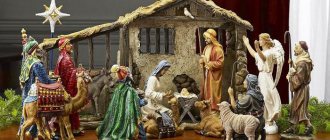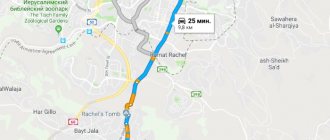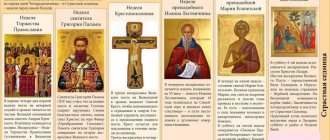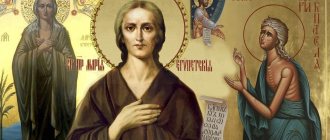Compline is a service performed late in the evening, just before going to bed. Its name comes from the word “evening” - dinner. In monasteries, monks serve Compline after finishing the common meal.
Compline is great and small. Great Compline is served only on the feasts of the Nativity of Christ and the Epiphany, as well as during Lent. Small Compline is a daily service that is performed in some monasteries. In other monasteries, Compline is not served, but is read by each monk in his cell. Until the 17th century, the laity also read Little Compline before going to bed, and later, on its basis, the evening prayer rule used today arose.
On the days when the All-Night Vigil is celebrated, there is no small Compline, and the Great Compline is included in the All-Night Vigil instead of Vespers (on the eve of Christmas and Epiphany).
Order of serving Small Compline
After the usual beginning, Psalms 50, 69 and 143 are read, then the daily doxology (a prayer praising the goodness of God) and the Creed. Then the canon of the day according to Octoechos is read in conjunction with the canon of a saint or holiday. After “It is worthy to eat,” the troparia of the holiday or saint, the day of the week, or the temple in which the service is performed are read. Then prayers are read to Christ and the Most Holy Theotokos, the priest performs the dismissal and asks for forgiveness from those praying, then pronounces the litany. At the end of the service, all the monks ask for forgiveness from the abbot, and returning to their cell, everyone reads to themselves the prayer “Forgive those who hate and offend us, O Lord who loves mankind...” (it can be found in full in the “Evening Prayers” section).
Order of Great Compline
Great Compline consists of three parts. In the first part, after the usual beginning, Psalms 4, 6, 12, 24, 30, 90 are read. In the 1st week of Great Lent, Psalm 69 is read instead, and then the Penitential Canon of St. Andrew of Crete. After this, the choir sings verses from the book of the prophet Isaiah, “For God is with us,” then troparia, in which they thank God for the past day and ask Him for a night without sin and temptation. The creed, troparia of the day and prayers are read. In the second part, Psalms 50 and 101 are read, the prayer of Manasseh (from the Old Testament Book of Chronicles), “Our Father” and troparia are read. The third part begins with Psalm 69 (in the 1st week of Lent - 142), followed by daily doxology and a canon to the saint or the Mother of God. Poems of praise to God are sung, and during Lent the prayer of Ephraim the Syrian is said with prostrations to the ground. Then prayers are read to the Lord and the Most Holy Theotokos, the priest performs dismissal (on Friday or on the eve of holidays, instead of dismissal, he reads a special prayer) and asks for forgiveness from those praying, then pronounces a litany. At the end of the service, all the monks ask for forgiveness from the abbot, and returning to their cell, each reads to himself the prayer “Forgive those who hate and offend us, O Lord who loves mankind...” (it can be found in full in the “Evening Prayers” section).
Days of Great Compline
1.On the eve of Wednesday and Friday of Cheese Week (however, if the Presentation of the Lord occurs on one of these days, then Compline is not celebrated).
2.All weekdays (Monday - Friday) of the Holy Pentecost in the evening (except for Wednesday and the heel of the 5th week, and also with the exception of March 25 in the evening, on the eve of the Feast of the Annunciation).
3.Maundy Monday and Maundy Tuesday evening.
4. On Christmas Day and Epiphany as part of a vigil.
Follow-up of Great Compline
First, let us consider the rite of the usual Great Compline, celebrated in the evening on fast days (except Fridays) of the 2nd, 3rd, 4th, 5th and 6th weeks of the Holy Pentecost.
The rite of Great Compline is found in the Book of Hours and the Followed Psalter, and its charter is in the 49th chapter of the Typikon (Monday of the 1st week of Great Lent).
The rite of Great Compline consists of the usual beginning and three parts, each of which begins with “Come, let us worship...”. Therefore, it is advisable that Compline be read by three readers as follows:
first reader - usual beginning and 1st part;
second reader - part 2;
third reader - 3rd part.
The usual beginning and part 1
The priest puts on an epitrachelion, goes out onto the solea, stands in front of the royal doors and proclaims: “Blessed is our God...”.
Reader: “Amen. Glory to Thee, our God, glory to Thee. To the Heavenly King...”, Trisagion according to “Our Father...”.
Priest ( exclamation)
):
“For Thine is the Kingdom...”.
Reader: "Amen." “Lord, have mercy” ( 12 times
).
"Glory, even now" [202] . “Come, let us worship...” Psalm 4: “Call me sometimes...” Psalm 6: “Lord, let not Your wrath…” Psalm 12: “How long, O Lord, will you forget me completely...” "Glory, even now." "Alleluia" ( three times
).
“Lord, have mercy” ( three times
).
"Glory, even now." Psalm 24: “To You, O Lord, I have lifted up my soul...” Psalm 30: “In Thee, O Lord, have I trusted...” Psalm 90: “He lives in the help of the Most High...” “Glory, and now,” “Alleluia” ( three times
),
“Lord, have mercy” ( three times
),
“Glory, and now.”
The reader (sometimes the canonarch) loudly and solemnly proclaims: “God is with us, understand the pagans and repent, for God is with us.”
Chorus: “God is with us...” ( 2 times in full
).
Then the reader reads the verses, and the choir finishes the chorus to each verse: “For God is with us.”
Reader: “Hear to the last of the earth.”
Chorus: “For God is with us.”
Reader: “You who are able, repent.”
Chorus: “For God is with us” ( hereinafter according to the text of Great Compline
).
<�…>
Reader: “Father of the next century” ( last verse
).
Chorus: “For God is with us.”
Reader: “God is with us, understand the Gentiles...” ( in full
).
Choir: “God is with us...” ( in full
).
Reader: “Glory to the Father and the Son and the Holy Spirit.”
Choir: “God is with us...” ( in full
).
Reader: “And now and ever and unto ages of ages. Amen".
Choir: “God is with us...” ( in full
).
Reader: “The day is over, I thank You, Lord...” “Glory”: “The day has passed, I will praise you, Master...” “And now”: “The day is past, I will praise you, O Holy One...” “The ethereal cherubic nature...” “I believe in One God the Father...”
Priest: “Most Holy Lady Theotokos, pray for us sinners” and bows to the ground.
The choir repeats: “To the Most Holy Lady Theotokos...” ( twice
).
Priest: “All the heavenly powers of the Saints Angels and Archangels, pray for us sinners” ( bow to the ground
).
The choir repeats this chant once.
In a similar way, the address to other saints takes place according to order: the priest proclaims the next chant and bows, and the choir repeats the chant once.
After the final chant ( “God, cleanse us sinners and have mercy on us” ), the reader reads the Trisagion after “Our Father...”. In the Church Charter this Trisagion is called the “first Trisagion.”
Priest ( exclamation)
):
“For Thine is the Kingdom...”.
The reader says: “Amen” and reads troparia from the Book of Hours:
Monday and Wednesday evening
:
“Enlighten my eyes...”, “Glory”: “Be the protector of my soul, O God...”, “And now”: “As imams are not bold...”.
Tuesday and Thursday evenings
:
“The invisible enemy...”, “Look and hear me...” ( verse
),
“How terrible is Thy judgment...”, “Glory”: “Give me tears, O God...”, “And now”: “Unashamed, O Mother of God, hope Having yours...”
After the troparions, the reader reads in all cases: “Lord, have mercy” ( 40 times
),
"Glory, even now."
“The most honorable Cherub...” “Bless you in the name of the Lord, father.” Priest: “Through the prayers of the saints, our fathers, Lord Jesus Christ our God, have mercy on us.”
Reader: "Amen." And he reads the prayer of St. Basil the Great: “Lord, Lord, deliver us from every arrow that flies in the days...”.
Part 2
Reader: “Come, let us worship...” Psalm 50: “Have mercy on me, O God, according to Your great mercy...” Psalm 101: “Lord, hear my prayer and let my cry come to You...” Prayer of Manasseh: “Lord Almighty, God of our fathers...” Trisagion according to “Our Father...” (“second Trisagion”).
Priest: “For Thine is the kingdom...”
The choir sings repentant troparia: “Have mercy on us, Lord...”. “Glory”: “Lord, have mercy on us...” “And now”: “Open the doors of mercy for us...”
Reader: “Lord, have mercy” ( 40 times
).
“Glory, even now”, “More honorable than the Cherubs...”, “In the name of the Lord...”.
Priest: “Through the prayers of our holy fathers...”
Reader: "Amen." And the prayer “Master God Father Almighty...”.
Part 3
Reader: “Come, let us worship...” Psalm 69: “God, come to my help...” Psalm 142: “Lord, hear my prayer, grant my prayer...” “Glory to God in the highest...” ( doxology
).
The choir and the reader perform the canon according to the Charter (irmos are sung once, there is no chaos). During the period we are considering (from Monday of the 2nd week to Thursday of the 6th week inclusive), at Compline, along with the canons of the Theotokos from Octoechos, the canons of those saints whose memory will occur in the period from Saturday of Lazarus to the Sunday of Antipascha inclusive are sung. In this case, the canon of the Theotokos is sung first, and after it the canon of the Menaion.
By 3rd song
:
“Lord, have mercy” ( three times
) (instead of the small litany), kontakion of the Menaion, sedalene of the Menaion,
“Glory, even now”: Theotokos of the Menaion.
By the 6th song
:
“Lord, have mercy” ( three times
),
“Glory, even now”: sedal to the Mother of God from Octoechos.
By the 9th song
is sung
.
Reader: The Trisagion according to “Our Father...” (immediately after “It is worthy to eat...”, this Trisagion in the Charter is called the “third Trisagion”).
Priest: “For Thine is the kingdom...”
Choir: “Amen. Lord Almighty..." ( with verses
).
“Glory”: “Lord, if Thy saints had not been, they had prayer books...”
“And now”: “Many are the multitude of my, Mother of God, sins...”, “All-Holy Mother of God...”, “All my hope...”. Reader: “Lord, have mercy” ( 40 times
).
Prayer: “For every time and every hour...” “Lord, have mercy” ( three times
),
“Glory, even now” , “The most honorable Cherub...”, “In the name of the Lord...” .
Priest: “God, be gracious to us...”
Reader: "Amen."
The priest pronounces the prayer of St. Ephraim the Syrian twice with 16 bows as follows: “Lord and Master of my life, do not give me the spirit of idleness, despondency, covetousness and idle talk” ( bow to the ground
).
“Grant to me, Thy servant, the spirit of chastity, humility, patience and love” ( bow to the ground
).
“Hey, Lord the King, grant me to see my sins and not condemn my brother, for blessed are you forever and ever. Amen" ( bow to the ground
).
Then 12 bows from the waist with the prayer “God, cleanse me, a sinner” (this prayer is said secretly, although it is permissible for the priest to say it out loud).
At the end, the priest again loudly pronounces the prayer of St. Ephraim the Syrian (this time in its entirety) and makes another bow to the ground. Afterwards the reader says: “Amen” and reads the Trisagion according to “Our Father...” (“the final Trisagion”).
Priest ( exclamation)
):
“For Thine is the Kingdom...”.
Reader: "Amen." “Lord, have mercy” ( 12 times
) and prayers:
“Undefiled, Unblasphemous...”, “And grant us, O Master, our future sleep...”, “Glorious Ever-Virgin...”, “My Hope Father...”.
Priest: “Glory to Thee, O Christ God...”
Choir: “Glory, even now,” “Lord, have mercy ( three times
).
Bless."
The priest pronounces the great dismissal, with the prayer “Much merciful Master, Lord Jesus Christ our God... and save our souls, for you are good and a lover of mankind.” While reading the prayer, people kneel. After the prayer, the priest, addressing the people, says: “Bless, holy fathers (in parish practice it is added: brothers and sisters ) , forgive me the sinner.”
People: “God will forgive you, holy father.”
Priest: “Let us pray for the great lord...” While reading this prayer, the choir repeatedly slowly sings “Lord, have mercy.” At the end of the prayer, the priest exclaims: “We pray for them too” [203].
Chorus: “Lord, have mercy” ( three times
).
Priest: “Through the prayers of our holy fathers...”
Chorus: "Amen."
The Eve of the Nativity of Christ (Christmas Eve) - FEATURES OF THE SERVICE
In the 1st hour, of the usual psalms, only the 5th remains. The special 44th psalm depicts the beauty and greatness of the Messiah, and the 45th psalm depicts God’s saving intercession of His city. The stichera depict the preparation of Bethlehem for the great event that is about to take place there, and the confusion of righteous Joseph at the sight of the Blessed Virgin not in vain. The Prokeimenon of the 1st hour speaks of the eternal adoption and endowment with the power of the Messiah (Ps. 2: 7-8). The Apostle tells about the greatness and superiority of the Son of God over the Angels (Heb. 1:1-10), the Gospel - about the circumstances immediately preceding the Nativity of Christ, and about the very event of the Nativity (Matthew 1:18-25).
In the 3rd hour, Psalm 50 is joined by Psalm 66, depicting the coming salvation of all who know God, and Psalm 86 - about the glory of Zion, communicated to it by the appearance of the Messiah in it. The first two stichera depict the humiliation that the Son of God took upon Himself through His birth on earth; the last stichera, as a continuation of the stichera of the 1st hour, speaks of how righteous Joseph, by faith, overcame his bewilderment regarding the non-celebration of his holy Betrothed. The Prokeimenon speaks of the very birth of the Messiah (Ps. 9:6). Proverbs announces the prophecy of the appearance of God on earth (Bar. 3:36–39). The Apostle talks about the coming of faith, about adoption by faith of God and about union with Christ (Gal. 3:23-29). The Gospel contains a more detailed account of the Nativity event itself than in the first hour (Luke 2:1–9).
In the 6th hour, Psalm 90 is left, to which the following psalms are added: 71 - depicting the Messiah as the Eternal King, His royal dignity will find recognition from the pagan peoples (prophecy of the worship of the Magi), and Psalm 131, depicting God's favor to the line of David, which will be expressed in preserving the Throne for him forever and in choosing Zion for the dwelling of God. The stichera call upon the entire universe to receive the coming Lord with dignity. The Prokeimenon is about the eternal birth of the Messiah and His sitting at the right hand of God (Ps. 109:3). Proverbs – Isaiah’s prophecy about the birth of the Messiah from a Virgin (Is. 7:10–16, 8:1–5, 8–10); The Apostle speaks about the pre-eternity of the existence of the Son of God (Heb. 1:10–2:3). The Gospel continues the description of the circumstances of the birth of the Savior, telling about the worship of the Magi (Matthew 2: 1-12).
In the 9th hour, Psalms 109 and 110 are added to Psalm 85. The first of them depicts the eternal birth of the Messiah, His sitting at the right hand of God and priestly dignity, the other depicts God’s deliverance of His people who believe in Him and the conclusion of the Covenant with them.
The first stichera describes the grief of mothers after Herod killed their babies; the second contains the answer of the Blessed Virgin Mary to Joseph’s bewilderment about Her non-idleness. The third concluding stichera illuminates the event of the Nativity in the light of the exhaustion of Christ revealed in it. The stichera ends with a call to worship of Christmas and a prayer for the coming Epiphany. The Prokeimenon points to the spiritual multiplicity of Zion (Ps. 86:5). The proverb presents a comprehensive picture of the ministry of the Messiah, for it was determined by His sonship of God (Isa. 9: 6-7). The Apostle talks about the main goal of the incarnation of the Son of God - His high priestly service (Heb. 2: 11-18). The Gospel, like the Apostle, speaks of the beating of infants, which was a foreshadowing of the suffering on the cross and the death of the “Baby Mary” (Matthew 2:13–23).
